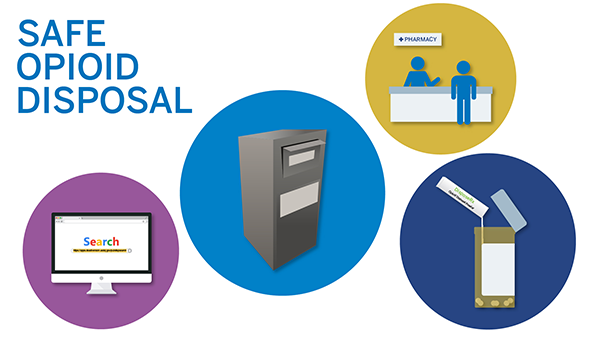How to Dispose of Expired Opioid Medication
From Seth A. Waldman, MD
Many home medicine cabinets are full of unused, expired prescriptions that build up as time goes by. Especially now, as the United States faces an opioid epidemic, it is vital to dispose of those medications safely.
The Centers for Disease Control and Prevention (CDC) has shown that more than 70% of people misusing opioids obtain them from a family member or a friend, often given freely or even stolen. Opioids from leftover prescriptions are also taken accidentally, sometimes by children or pets, or found by strangers due to improper disposal methods.

Safe Opioid Disposal Options
Some of our patients leave Hospital for Special Surgery (HSS) with a short-term prescription for opioids and other medications — some of which go unused and expire. Patients often ask us what to do with those medications to ensure they are properly thrown away. The two best options are to:
- Use safe disposal products. Charcoal bags or disposal powder deactivate the medications so they can be safely thrown away. These products can be found at many pharmacies or department stores. HSS also provides one of these disposal products to all surgical patients at discharge.
- Drop unused opioids into a medicine disposal drop box. These drop boxes are available at many pharmacies and police stations. You can use the DEA’s collection site locator to find a location near you that has a drop box. HSS also has a drop box located on our main hospital campus in the lobby of the Belaire building at 525 East 71st Street in New York City.
Here are a few more tips about safe disposal:
- If you are unsure of what to do, you can call your surgeon’s office for instructions on how to properly dispose of your prescriptions.
- While opioids cannot be flushed, several other prescriptions can. Here’s the FDA guidance on what can and cannot be flushed.
- Make sure to scratch out any personal information on medication bottles before disposing of them in the trash.
- You can also call your prescribing pharmacy and ask them about their take back services or to help you find a disposal drop box.
Properly disposing of unused medications is one of the most effective ways patients can fight the opioid crisis. By reducing the number of medications that can get into the wrong hands, you are not only limiting your own risk, you are also helping your family, friends and community.
Dr. Seth Waldman is an anesthesiologist in the Pain Management Division at HSS with more than 20 years of experience in pain management. To learn more about opioids and orthopedic care, please see our guide on Opioids and Your Recovery or our extensive Opioid Patient Safety and Education resources.
Back to Opioid Safety After Surgery
